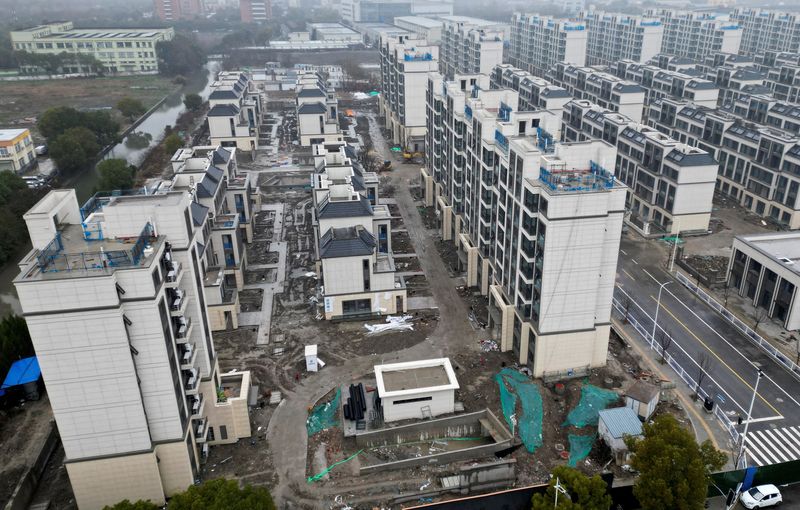By Jamie McGeever
ORLANDO, Florida (Reuters) – China’s political and economic leadership are thought to have a keen sense of history, but Beijing’s tepid response to the unfolding property crash that’s strangling the country’s growth and spreading deflation is baffling.
The clear lesson from major housing crises that have occurred in recent decades is that cure and recovery only come following bold, decisive action in the form of massive monetary and fiscal stimulus.
Beijing is providing neither and instead taking a scattergun approach.
The People’s Bank of China on Friday chose not to cut benchmark borrowing rates, but on Monday injected two-week cash into the banking system for the first time in months and at a lower rate too.
But in the words of the Institute of International Finance’s Gene Ma and Phoebe Feng, Beijing’s policy response has been “slow, timid, and sometimes very vague,” a far cry from the “big bazooka” that’s needed.
FALLING BEHIND
The impact of this muted response on China’s economy has been stark. Growth in 2024 is likely to fall short of the government’s 5.0% target, deflationary pressures are intensifying at an alarming rate, investment is collapsing, and credit growth is at a record low.
Morgan Stanley economists are now forecasting nominal GDP growth of just 3.9% this year and next. For comparison, nominal U.S. GDP growth is currently running at an annualized pace of around 5.5%.
China’s stock market is also a notable laggard. As the rising tide of global monetary easing has lifted stock markets around the world to new highs, China has gone in the opposite direction. Shanghai’s blue chip index is down 15% since May, has nearly halved since February 2021, and is close to making new multi-year lows.
In many cases, foreign capital is staying away or leaving. Chinese equity funds have attracted inflows in only two of the last 13 months, and foreign direct investment flows have turned negative, according to the IIF.
True, foreign investors have continued to participate in the country’s bond market rally. But the overall message is that investors are reluctant to invest in China until there’s a clear path to economic recovery.
And that’s nowhere in sight.
TRILLIONS NEEDED
The property sector is pivotal to the crisis. Its implosion is damaging growth, financial stability and household wealth. And the deflation it’s fueling is affecting corporate profitability and investment, while increasing real debt burdens.
At its peak three years ago the property sector accounted for a quarter of China’s GDP. Since then, housing investment is down 30%, home sales have halved, and housing starts have plunged by two thirds, according to the IIF.
Analysts at Jefferies reckon Beijing may need to spend at least 2 trillion yuan ($285 billion) this year to successfully implement its plan to reduce the country’s excess housing stock by purchasing unsold properties and converting them into social housing. And they estimate that up to 7 trillion yuan ($1 trillion) will be needed to get housing inventory down to more healthy levels.
EXCESSIVE CAUTION
So why isn’t Beijing firing the proverbial bazooka?
First, flooding the system with liquidity may not address the root cause of the crisis because China’s property bubble is a result of simple oversupply as much as debt-fueled leverage.
A flood of stimulus could also weaken the exchange rate so much that capital flight out of the country accelerates. And deep rate cuts would wipe out banks’ already slender interest margins. Finally, China’s leaders have simply shown themselves to be more cautious than cavalier.
But this policy paralysis has consequences.
By failing to follow its global peers in aggressively cutting rates, the PBOC has helped lift the yuan to its strongest level in over a year. The last thing China’s sluggish economy needs is a buoyant exchange rate.
Beijing’s hesitancy may reflect its concern about repeating the mistakes of Japan, which spent decades in a deflationary and slow-growth funk after its housing bubble burst in 1990. House prices there still haven’t fully recovered.
But taking an overly cautious approach could make this outcome more likely, not less.
WISHING AND HOPING
Many China bulls argue that Chinese assets are attractive because, when push comes to shove, Beijing will ultimately take the necessary steps to stimulate growth. How can investors ignore the world’s largest consumer of many key commodities – an innovative, competitive behemoth with a huge savings pool worth trillions of dollars?
But bonds aside, Chinese assets are cheap for a reason. Lots of reasons. And thus far, Beijing has shown little appetite for the overwhelming monetary and fiscal stimulus experts believe is necessary. This could obviously change. But, for now, there’s little indication that it will.
(The opinions expressed here are those of the author, a columnist for Reuters.)
(By Jamie McGeever; Editing by Andrea Ricci)

